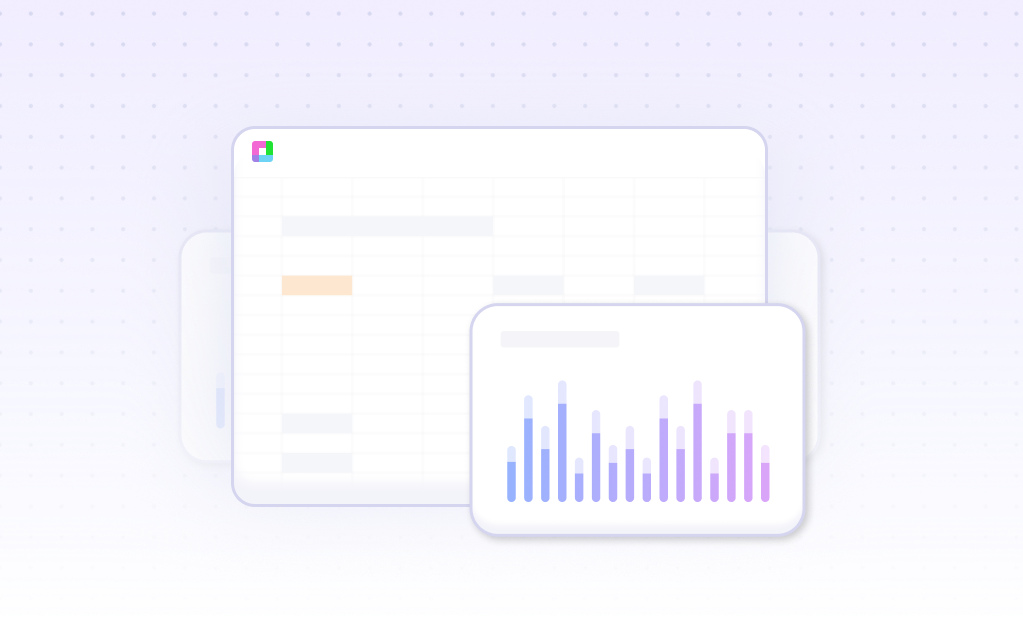
Medical Data Analysis Made Simple
Picture this: you're analyzing performance data from a new cardiac monitor, comparing efficacy rates across different patient demographics, and tracking regulatory compliance metrics—all while your colleague needs those insights for tomorrow's presentation. Sound familiar?
Biomedical engineering generates vast amounts of critical data, from device performance metrics to clinical trial results. Traditional analysis tools often fall short when dealing with complex medical datasets that require both statistical rigor and regulatory compliance. That's where Sourcetable transforms your workflow.
Whether you're optimizing prosthetic designs, analyzing imaging system performance, or evaluating therapeutic device efficacy, Sourcetable combines the familiar spreadsheet interface with AI-powered insights specifically designed for healthcare data analysis.
Why Healthcare Professionals Choose Sourcetable
Discover the key benefits
Medical Device Performance Tracking
Monitor device reliability, failure rates, and performance metrics across multiple patient populations with automated statistical analysis and trend detection.
Clinical Trial Data Management
Organize and analyze patient data, treatment outcomes, and safety metrics while maintaining HIPAA compliance and audit trails.
Regulatory Compliance Reporting
Generate FDA-ready reports and documentation with automated calculations, quality control checks, and standardized formatting.
Biomechanical Analysis
Process motion capture data, force measurements, and kinematic analysis with advanced statistical modeling and visualization tools.
Quality Control Automation
Implement automated quality checks for manufacturing processes, batch testing, and production line monitoring with real-time alerts.
Multi-Site Data Integration
Combine data from multiple research sites, hospitals, or manufacturing facilities into unified analysis dashboards.
Biomedical Engineering Analysis in Action
See how healthcare professionals use Sourcetable to solve complex analytical challenges
Cardiac Stent Performance Analysis
A medical device company analyzed 50,000+ patient records to evaluate new stent designs. Using Sourcetable's AI capabilities, they identified optimal size configurations that reduced restenosis rates by 23% while maintaining deployment success rates above 98%.
Orthopedic Implant Longevity Study
Researchers tracking hip replacement outcomes across 15 years of patient data discovered material composition factors affecting implant durability. The analysis revealed specific alloy combinations that extended average implant life by 4.2 years.
Diagnostic Imaging System Optimization
A hospital network optimized MRI scan protocols by analyzing image quality metrics, scan duration, and patient comfort scores. The resulting protocol changes reduced average scan time by 18% while improving diagnostic accuracy by 12%.
Prosthetic Control System Development
Engineers developing next-generation prosthetic limbs analyzed muscle signal patterns from 200+ amputee patients. The insights led to control algorithms that improved user satisfaction scores from 6.2 to 8.7 out of 10.
Pharmaceutical Delivery Device Testing
A drug delivery system manufacturer analyzed injection force data across different needle gauges and patient demographics. The study identified optimal injection parameters that reduced patient discomfort by 35% while maintaining drug efficacy.
Your Medical Data Analysis Workflow
From raw data to regulatory-ready insights in four simple steps
Import Medical Data
Upload data from any source—clinical databases, device logs, laboratory instruments, or research systems. Sourcetable automatically detects medical data formats and applies appropriate validation rules.
AI-Powered Quality Control
Our AI instantly flags potential data quality issues, identifies outliers, and suggests corrections. Built-in medical data validation ensures compliance with healthcare standards and regulations.
Advanced Statistical Analysis
Apply biostatistical methods, survival analysis, and clinical trial statistics with simple prompts. Generate power calculations, perform efficacy analyses, and create publication-ready statistical summaries.
Regulatory-Ready Reports
Export results in formats required by FDA, CE marking authorities, or institutional review boards. Maintain complete audit trails and documentation for regulatory submissions.
Built for Medical Technology
HIPAA-Compliant Data Handling
Every aspect of Sourcetable meets healthcare data security requirements. From encrypted data transmission to audit logging, your patient data and research results remain secure and compliant with medical privacy regulations.
Medical Statistics Library
Access specialized statistical functions designed for medical research: survival analysis, hazard ratios, number needed to treat (NNT), sensitivity/specificity calculations, and clinical trial power analysis. No more switching between multiple statistical software packages.
Device Data Integration
Connect directly to medical devices and laboratory instruments. Import data from ECG machines, blood analyzers, imaging systems, and research equipment without manual data entry or format conversion.
Regulatory Template Library
Start with pre-built templates for common regulatory submissions: 510(k) predicate analysis, clinical evaluation reports, risk management documentation, and post-market surveillance reports. Save weeks of formatting and ensure compliance.
Frequently Asked Questions
Is Sourcetable suitable for FDA regulatory submissions?
Yes, Sourcetable includes features specifically designed for regulatory compliance. You can generate audit trails, maintain data integrity documentation, and export results in formats accepted by FDA and other regulatory bodies. Our platform follows 21 CFR Part 11 guidelines for electronic records.
Can I analyze clinical trial data while maintaining patient privacy?
Absolutely. Sourcetable is HIPAA-compliant and includes built-in de-identification tools. You can perform statistical analysis on patient data while maintaining anonymity and meeting privacy requirements. All data is encrypted in transit and at rest.
How does Sourcetable handle large medical datasets?
Our platform is designed to handle datasets with millions of rows efficiently. Whether you're analyzing genomic data, imaging datasets, or multi-site clinical trials, Sourcetable's cloud infrastructure scales to meet your computational needs without performance degradation.
Can I integrate data from multiple medical devices?
Yes, Sourcetable supports integration with over 500 medical devices and laboratory instruments. Common integrations include ECG machines, blood analyzers, imaging systems, and research equipment. We also support standard medical data formats like HL7 and DICOM.
What statistical methods are available for biomedical analysis?
Sourcetable includes comprehensive biostatistical capabilities: survival analysis, logistic regression, ANOVA for repeated measures, power analysis, meta-analysis tools, and specialized medical statistics like sensitivity/specificity calculations and clinical significance testing.
How do I ensure data quality in my medical research?
Our AI-powered quality control automatically identifies missing values, outliers, and inconsistencies in medical data. You can set custom validation rules, implement range checks, and create automated quality reports that meet research standards and regulatory requirements.
Frequently Asked Questions
If your question is not covered here, you can contact our team.
Contact Us




